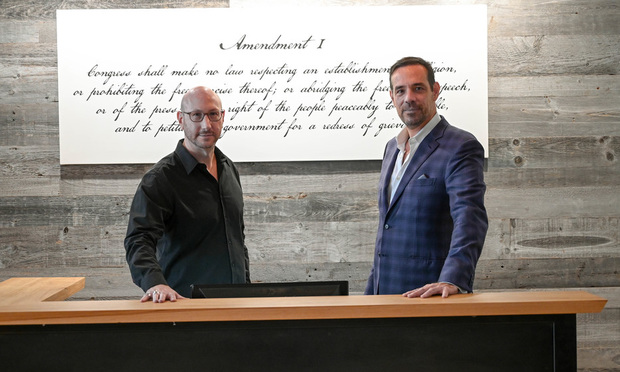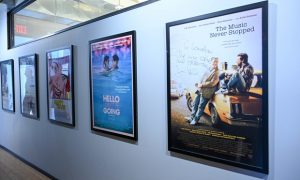Entertainment Law Firm Gray Krauss Breaking Up, Birthing New Firms
The moves by Jonathan Gray, David Schwartz and others mark a shakeup in the entertainment world's bicoastal legal ecosystem.
September 25, 2019 at 05:02 PM
5 minute read
 David F. Schwartz, left, and Jonathan Gray at Gray Schwartz. Photo: David Handschuh/NYLJ
David F. Schwartz, left, and Jonathan Gray at Gray Schwartz. Photo: David Handschuh/NYLJ
The bicoastal entertainment law firm Gray Krauss Sandler Des Rochers is nearing completion of a breakup, with its partners spinning off several new firms in the process.
Jonathan Gray and David Schwartz, who were respectively partner and of counsel, have started Gray Schwartz, currently a two-man firm, and created a consulting business to provide non-legal services. Gray is known for his work in the indie film sphere, while Schwartz focuses on theater, and both also produce shows and projects. As lawyers, they advise producers, writers, investors and other entertainment industry players.
They continue to share a Chelsea office with their former partner Andre Des Rochers, whose new firm, started with Los Angeles music lawyer Damien Granderson, is called Granderson Des Rochers. Granderson is formerly of another bicoastal firm, Davis Shapiro Lewit Grabel Leven Granderson & Blake, which is now just called Davis Shapiro Lewit Grabel & Leven, according to a person who answered the phone there.
New York-based partner Joshua Sandler, who represents film, TV, publishing and new media talent, among other clients, has also joined Granderson Des Rochers. Evan Krauss, a former partner representing artists, songwriters and others in negotiations with record companies, joined Eisner in New York, that firm announced in July.
In an interview with ALM at their offices, Gray and Schwartz said there was no animosity in the breakup of the 21-lawyer firm. Gray, for his part, said he wanted to focus on his clients—including film production companies and other players in the movie and television industries—and on his own production work, rather than having to devote so much time to firm administration.
"I found, like so many other small businesses, you kind of pass that tipping point where the focus becomes about the management of the business rather than, personally speaking, what I love, which is legal work, and specifically doing legal work in the film and television world," he said.
 Movie posters at Gray Schwartz. Photo: David Handschuh/NYLJ
Movie posters at Gray Schwartz. Photo: David Handschuh/NYLJSomeone swinging by what used to be the Gray Krauss offices will notice some changes. For one, Gray Schwartz's logo is beside the door. The business, too, is changing somewhat, and more for Gray than for Schwartz. Some periods are "heavy lawyering," Schwartz said, while other time is spent on non-legal consulting and production work.
Projects the two of them have worked on recently include the award-winning documentaries "American Factory" and "One Child Nation," picked up by Netflix and Amazon, and the shows "The Lightning Thief" and "A Bronx Tale."
Gray said he's doing less production counsel work for narrative, or fictional, films and focusing on documentaries and the business of producing; he said he's referred 50% of his workload to other lawyers. He said he and Schwartz have overlapping but distinct practices that lend themselves to an eat-what-you-kill type arrangement.
But a lot has stayed the same, too. The New York office still shares space with a post-production company called Gigantic Studio, which has drawn big-name visitors like U2, Paul Simon and the acclaimed editor and sound mixer Walter Murch. Several producers work from the location, as do other lawyers, including Nicole Compas, a former Gray Krauss lawyer now with Ramo Law.
The place is also decked out with movie posters; it's not many firms whose art galleries have been featured in New York magazine. Nor are there many lawyers whose offices include a voice-over and foley studio, where audio that wasn't picked up during a shot, like heels clicking across New York City pavement, can be recorded.
"Hundreds and hundreds of people come" to events in the office, Schwartz said. "It's part of this incredible community that really Jonathan has built over the years."
The business, too, is pretty similar, at least for Gray and Schwartz. It continues to be the case that most revenue isn't from hourly fees; nearly all of their work as counsel for production companies, for example, is flat-fee, and other work, like Gray's deal with his longtime advertising client SpotCo, is built around a monthly fee. Some fees are based on percentages of a client's earnings, which is common in the TV industry, they said, and some work is hourly.
The wind-down of Gray Krauss and the wind-up of the new firms didn't happen overnight, but it isn't totally complete, either. While it was reported in July that Davis Shapiro was splitting in two, the firm's website is still up, and Granderson Des Rocher's website isn't up yet. (Gray Schwartz's went up this week.) Gray said the process has unfolded over the course of a year or so.
Reached by phone, Des Rochers said that he and Granderson, whose firm counts about 15 lawyers, are staying out of the spotlight "until the machine is well-oiled and up and running." He said Gray Krauss "had a great run," doing work for dozens of award-winning films, but his own practice evolved from finance and production counsel to talent representation during his time at the firm.
This content has been archived. It is available through our partners, LexisNexis® and Bloomberg Law.
To view this content, please continue to their sites.
Not a Lexis Subscriber?
Subscribe Now
Not a Bloomberg Law Subscriber?
Subscribe Now
NOT FOR REPRINT
© 2025 ALM Global, LLC, All Rights Reserved. Request academic re-use from www.copyright.com. All other uses, submit a request to [email protected]. For more information visit Asset & Logo Licensing.
You Might Like
View All

Three Akin Sports Lawyers Jump to Employment Firm Littler Mendelson

Brownstein Adds Former Interior Secretary, Offering 'Strategic Counsel' During New Trump Term
2 minute read
Trending Stories
Who Got The Work
J. Brugh Lower of Gibbons has entered an appearance for industrial equipment supplier Devco Corporation in a pending trademark infringement lawsuit. The suit, accusing the defendant of selling knock-off Graco products, was filed Dec. 18 in New Jersey District Court by Rivkin Radler on behalf of Graco Inc. and Graco Minnesota. The case, assigned to U.S. District Judge Zahid N. Quraishi, is 3:24-cv-11294, Graco Inc. et al v. Devco Corporation.
Who Got The Work
Rebecca Maller-Stein and Kent A. Yalowitz of Arnold & Porter Kaye Scholer have entered their appearances for Hanaco Venture Capital and its executives, Lior Prosor and David Frankel, in a pending securities lawsuit. The action, filed on Dec. 24 in New York Southern District Court by Zell, Aron & Co. on behalf of Goldeneye Advisors, accuses the defendants of negligently and fraudulently managing the plaintiff's $1 million investment. The case, assigned to U.S. District Judge Vernon S. Broderick, is 1:24-cv-09918, Goldeneye Advisors, LLC v. Hanaco Venture Capital, Ltd. et al.
Who Got The Work
Attorneys from A&O Shearman has stepped in as defense counsel for Toronto-Dominion Bank and other defendants in a pending securities class action. The suit, filed Dec. 11 in New York Southern District Court by Bleichmar Fonti & Auld, accuses the defendants of concealing the bank's 'pervasive' deficiencies in regards to its compliance with the Bank Secrecy Act and the quality of its anti-money laundering controls. The case, assigned to U.S. District Judge Arun Subramanian, is 1:24-cv-09445, Gonzalez v. The Toronto-Dominion Bank et al.
Who Got The Work
Crown Castle International, a Pennsylvania company providing shared communications infrastructure, has turned to Luke D. Wolf of Gordon Rees Scully Mansukhani to fend off a pending breach-of-contract lawsuit. The court action, filed Nov. 25 in Michigan Eastern District Court by Hooper Hathaway PC on behalf of The Town Residences LLC, accuses Crown Castle of failing to transfer approximately $30,000 in utility payments from T-Mobile in breach of a roof-top lease and assignment agreement. The case, assigned to U.S. District Judge Susan K. Declercq, is 2:24-cv-13131, The Town Residences LLC v. T-Mobile US, Inc. et al.
Who Got The Work
Wilfred P. Coronato and Daniel M. Schwartz of McCarter & English have stepped in as defense counsel to Electrolux Home Products Inc. in a pending product liability lawsuit. The court action, filed Nov. 26 in New York Eastern District Court by Poulos Lopiccolo PC and Nagel Rice LLP on behalf of David Stern, alleges that the defendant's refrigerators’ drawers and shelving repeatedly break and fall apart within months after purchase. The case, assigned to U.S. District Judge Joan M. Azrack, is 2:24-cv-08204, Stern v. Electrolux Home Products, Inc.
Featured Firms
Law Offices of Gary Martin Hays & Associates, P.C.
(470) 294-1674
Law Offices of Mark E. Salomone
(857) 444-6468
Smith & Hassler
(713) 739-1250









